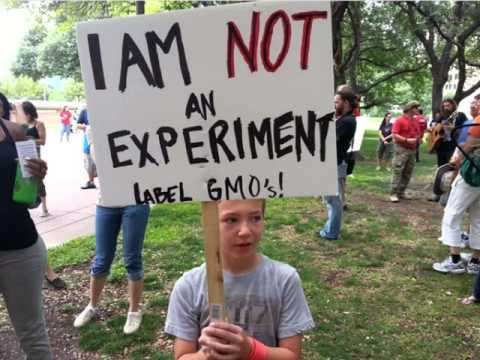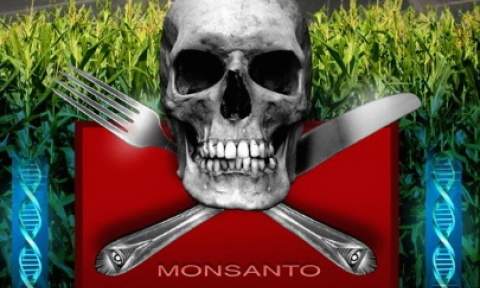On GMOs, Industry, Activists, Scientists, and Journalism
A freakish element has long colored the historically impassioned GMO debate.
The “frankenfood” term was first advanced decades ago by anti-GMO activists to play into health fears about foods produced from the (then) new genetic engineering technology. (These concerns have not been borne out by science.) Today, the meme is an ingrained feature of the discourse, echoed widely in the media.
So if advocacy groups opposed to GMOs want to campaign against, say, genetically engineered salmon, it makes sense for them to continue to “franken” the discourse. It is an effective framing device. Many in media are habituated to the metaphorical cue.
The franken imagery and language long ago set the tone. Sometimes the pictures are more subtle but the core message is the same.
Today, a new generation of activists carry the torch.
Tell the world you are not a #ScienceExperiments #GMO Donate /support /get –a T-Shirt help: https://t.co/OY2hhZlk7C
— Rachel (@RachelsNews) October 21, 2015
It also helps to have a stock villain anchoring the message.
You often need a villain to rally people around a cause.
Monsanto, a former chemical company turned biotech seed giant, is right out of central casting. As I wrote in this piece a few years ago,
if you punch the company’s name into an internet search engine, you’ll encounter a bewildering universe of ugly allegations and invective embellished with photoshopped images of demonic-looking children eating corncobs and oddly shaped vegetables spurting blood. The most strident anti-biotech websites refer to the company as Monsatan.
Given the feverish atmospherics and rhetoric that curdles discussion, it should come as no surprise that some of the characters who create the most sound and fury about GMOs seem to have sprung from a T.C. Boyle or Carl Hiaasen novel. There is the self-proclaimed flying yogi, Jeffrey Smith, who studied business at the Maharishi International University, and who has reinvented himself as a popular GMO critic. Despite having no scientific background, Smith has been featured several times on Dr. Oz, and has appeared before state legislators around the country as an expert witness in scientific debates about GMOs. He has also, fittingly, been served up as comical red meat on the Daily Show.
Then there is the conspiracist and self-proclaimed consumer wellness champion, Mike Adams, who runs a batty internet website called Natural News, which is impossible to parody. Last year, he created a stir when he said that Monsanto was equivalent to Hitler’s Nazi regime and that some science advocates, journalists, and media outlets who had challenged numerous anti-GMO activist claims were “Monsanto collaborators” and thus akin to Nazis. He then proceeded to construct a special website where all the “Monsanto collaborators” were essentially put on a hit list.
After an uproar, the page was later taken down and Adams claimed that the “Monsanto Collaborators website is a bait-and-switch trap engineered by the biotech industry.”
Much of this would be easy to dismiss if it were isolated to a fringe corner of the internet that received little attention. But Adams, like Jeffrey Smith, has also been introduced to the mainstream by Dr. Oz. They may be viewed as cranks by more sober-minded GMO critics, but make no mistake: Adams and Smith are tapping into the Monsanto-hating, I-am-not-a-science-experiment, Frankenfood delirium. They are to the anti-GMO movement what Donald Trump and Ben Carson are to the base of the Republican party.
In other words, there is a passionate audience for what they are peddling.
Yes, I realize that the American public is largely clueless and indifferent to GMOs. Jimmy Kimmel on his late night show amusingly demonstrated this. But guess what, this topic is no laughing matter for the developing world. There are real consequences when GMO opponents use fear-mongering to poison the crop biotechnology debate in Africa and Asia.
What’s most puzzling to those of who have covered these fraught conflicts is how GMO advocates in the scientific community stepped into the fray. It’s as if they didn’t recognize the playing field they are on. Anti-GMO sentiment springs from 1) fear factors (fear of the unknown) and 2) industry distrust. When pro-GMO advocates decided in recent years to get serious about communicating with the public, did they not survey the landscape they would have to navigate? You know, the frothy Frankenfood world where Monasatan is the overlord.
What am I getting at? Well, a couple of years ago, leading biotech researchers and communicators signed on to an initiative meant to address what seemed like increasing public concerns about the safety of GMOs. That iniative became a website called GMO Answers. It is funded by the biotech industry and run by a public relations company.
As a journalist, I never paid any attention to the site because of the industry connection. If I need answers to a science question about GMOs, that’s the last place I’d look. It didn’t matter that there were scientists I respected who had contributed to the site. In my mind, it was automatically tainted by its association with the biotech industry, which has incentive to promote GMOs in the best light. It didn’t matter that industry and mainstream science on GMOs were aligned on the safety issue. What mattered was a history of corporate misdeeds that included considerable efforts to muzzle or play down legitimate scientific concerns about consumer safety.
So I wasn’t surprised when anti-GMO activists viewed the GMO Answers website suspiciously. And I couldn’t fault them for filing Freedom of Information requests to learn if any of the public academics contributing to an industry-funded website had close connections to Monsanto, which is the bogeyman in the anti-GMO sphere. When a number of scientists alerted me to the FOIAs last February, I reported the story for Science magazine.
That was also the first time I looked at the GMO Answers website.
When I was reporting this story, I was struck by the indignation biotech scientists expressed at the Freedom of Information requests. Sure, an anti-GMO activist is going to view these records differently than, say, a journalist, and likely will spin them to advance his own agenda. Journalists expect both industry and activists to spin everything to their advantage.
But that’s beside the point, I said. By participating in an industry-funded site, you set yourself up for extra close scrutiny of your dealings. What were you thinking when you signed on to participate in this endeavor? Are you not aware that people have legitimate reason to be suspicious of industry? Oh, and by the way, did you know that Monsanto has this wee bit of public relations problem with its image?
To the best of my memory, every scientist I said this to waved me off. I got the, ‘yeah, but…” I never took any money…the science is the science, regardless of industry association…I’m insulted that anyone would think I’d sell out my professional reputation to write a few answers about safety issues…and so on. Their collective cluelessness astonished me.
When some of these scientists continued to play the indignity card privately and publicly, I sympathized with their predicament, but I also firmly defended the right of the anti-GMO activists to use FOIA. (There are journalists who can bear witness to this.) It doesn’t matter what motivated the anti-GMO activist to FOIA scientists. Sure, I’m on board with efforts to keep FOIA from being used as a harassing or bullying tactic, but in principle, I’m fine with FOIA and wouldn’t want any reform efforts to weaken the laws of an essential accountability tool.
Many people who have followed the GMO/FOIA story knows what happened next. In July, I reported on the first batch of emails released to the anti-GMO group. My piece revealed that one scientist (Kevin Folta) who had become a front-line communicator in the GMO debate had a closer working relationship with industry than he had let on publicly. It wasn’t related to anything he did research-wise, which led him to believe that there was nothing wrong with the nature of his industry relationship. But in fact, Folta had worked with industry representatives on messaging and outreach. That was a big no-no.
At first, Folta didn’t understood what all the fuss was about. After all, he was right about the science, so what did it matter that industry just wanted to help him amplify the facts? I’ve tried and I’ve tried and I’ve tried to get across to him and his colleagues why this reasoning is wrong. I think they may finally be starting to get it, but I’m not sure.
Anyway, there have been more stories by other journalists on Folta and his email records, notably a deep dive by the New York Times. More recently, Brooke Borel, an accomplished science journalist, has revealed another facet to Kevin Folta’s story, related to his role as a science communicator. You should read it.
There are a number of things in Borel’s story that jumped out at me. This one passage, when she recounts a conversation she had with Folta, resonated:
I argued that science would benefit from some independent scientists without any ties to industry. He brushed me off, saying that the science would always speak for itself no matter who was conducting it.
Folta and his colleagues are realizing, belatedly, that this is not true. Science does not speak for itself. If Folta and his colleagues had given more thought to the legacy that makes some rightfully suspicious of industry, if they had been more attuned to the freakish GMO landscape they operate in as science communicators, might they have done things differently?
Note: This is the first of a series of posts related to GMOs and journalism.




